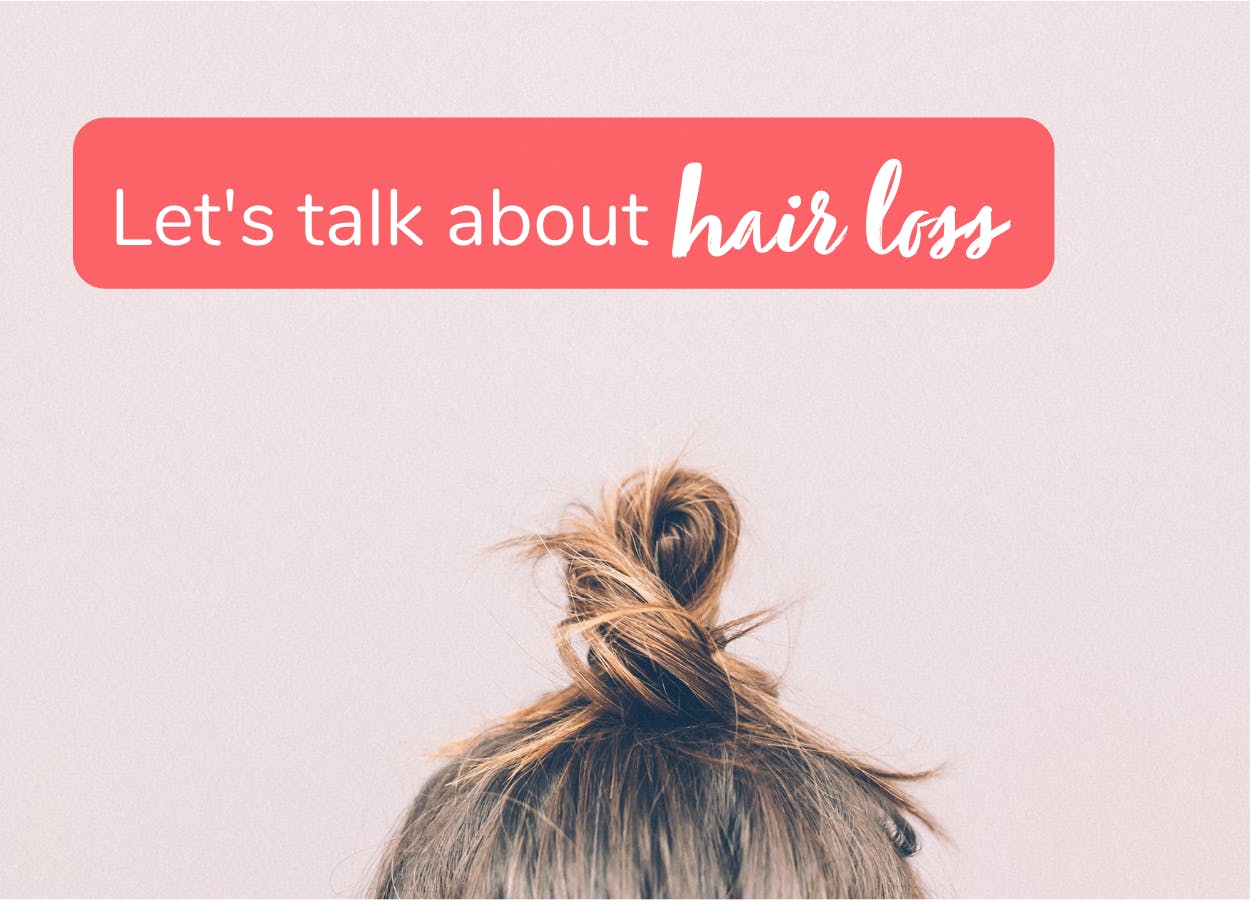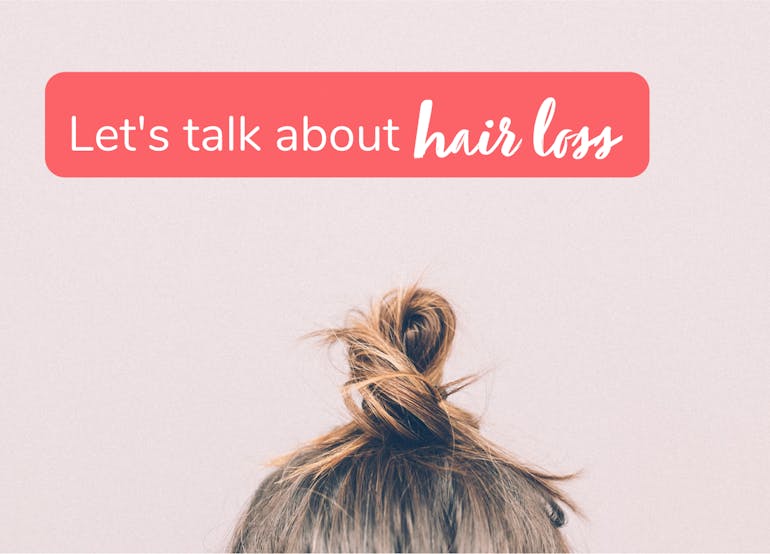Here's everything you need to know about hair loss
Reviewed and fact-checked by Giulia Guerrini, Superintendent Pharmacist. Read our editorial policy to see how we create informative, accurate content.
Hair loss is a natural part of the way your body functions, which tends to happen more when you age. It’s usually nothing to be worried about, although sometimes there can be an underlying medical condition. If you’ve ever wondered "how much hair loss is normal, anyway?" you might be surprised to know that you’ll lose between 50 and 100 strands of hair each day. If you have long hair, this hair loss might be more noticeable (like when you see all the hair left in your hairbrush, or in the shower…), but it’s perfectly normal.
Here’s everything you need to know about hair loss causes, hair loss treatment and even how to prevent hair loss. Need to get to the important bit for you? Jump to a section below:
- Hair loss causes
- Androgenetic alopecia
- Hair loss after pregnancy
- Telogen effluvium
- Alopecia areata
- Traction alopecia
- Medications
- Deficiency of nutrients
- Ringworm (tinea capitis)
- How to prevent hair loss
- Hair loss treatment

_hair_loss_causes"> Hair loss causes
General hair loss is absolutely normal, but sometimes the reasons for hair loss can stem from a medical condition, medications, infections, a lack of nutrients or even stress. Some types of hair loss are permanent, like female and male pattern baldness, but some others can be treated or will usually resolve themselves over time.
_androgenetic_alopecia"> Androgenetic alopecia
Androgenetic alopecia is the medical name for male or female pattern baldness, and it’s the most common type of hair loss. This is a genetic condition that usually starts as you get older, but sometimes can start at any time after puberty. Female pattern baldness can sometimes start to develop after menopause and, unlike male pattern baldness, your hair will start thinning all over, but your hairline will stay the same. Men who have androgenetic alopecia generally start to lose hair around their temples and on the crown of their head.
Our pharmacist, Giulia, says, "Losing your hair can be distressing, especially when it’s genetic. There are some hair loss treatments, like Finasteride Accord (PGD) 1mg 28 Tablets or Propecia Finasteride (PGD) 1mg 28 Tablets that can help to slow down the thinning process and encourage hair regrowth. You can also try Nourkrin Woman 30 Tablets 15 Days Supply, too."
_hair_loss_after_pregnancy"> Hair loss after pregnancy
Here’s something you might not know about pregnancy: postpartum hair loss is absolutely normal and many women experience it after giving birth. This type of hair loss after pregnancy is caused by lower oestrogen levels. It’s a temporary condition that will usually get better within a year, and really nothing to worry about (we promise) – but if you’re self conscious about your hair loss, you can use certain products or try a few things to improve the appearance of your hair, such as:
- Volumising shampoo, like Jason Thin-to-Thick Extra Volume Shampoo
- Shampoo designed for fine hair, like Plantur 39 Shampoo for Fine & Brittle Hair
- Avoid using intensive conditioners, or any products that could be too heavy for your hair
_telogen_effluvium"> Telogen effluvium
Fun fact alert! All of your hair goes through two phases: the anagen phase where your hair is actively growing, and the telogen phase where it’s resting. Usually about 90% of your hair is in the growing phase, and only 10% in the resting phase. Hair loss happens after your hair has gone into its resting phase for about two to four months. Telogen effluvium is a type of hair loss that happens when your body causes more of your hair to enter the resting phase. This type of hair loss can be caused by:
- Severe stress
- Surgery
- Childbirth
- Fast weight loss
- Certain medications
- Thyroid problems
- A sudden, significant shock or traumatic event
- Being sick and having a fever
This is sometimes what will cause hair loss after COVID infection, too. Telogen effluvium is usually temporary and your hair will start to grow back over time. It’s a good idea to see your GP or chat to a pharmacist who might be able to help diagnose the type of hair loss you have and recommend some hair loss treatments.
Our pharmacist, Giulia, says, "Telogen effluvium can sometimes cause your hair to fall out in handfuls, which can be really scary. Don’t worry, it’ll usually grow back – and the only way to really have that happen is to remove the trigger and give your hair enough time to recover, while you relax and get in enough nutrients to help. In the meantime, you could try Regaine Foam for Men – it contains 5% minoxidil, which can help when applied to your scalp."
_alopecia_areata"> Alopecia areata
If your hair starts to fall out quite suddenly, there’s a chance you may have an autoimmune condition called alopecia areata. This type of hair loss can affect anyone, but it usually starts before people reach the age of 30. Alopecia areata causes your hair to fall out in small patches. For some people this will only be a few small clumps, but in others it could be more extreme.
Alopecia areata is hair loss that’s caused by your immune system attacking your hair follicles. This attack causes them to shrink and slow down the follicles producing new hair. Scientists aren’t sure why it happens, but there seems to be a link to genetics, and you’re more likely to get this type of hair loss if a close family member has suffered from the same thing. Unfortunately, there isn’t a cure, but there may be potential hair loss treatment options that you can discuss with your doctor.
_traction_alopecia"> Traction alopecia
Nobody really likes hair loss, so there’s no ‘good’ type of it... but, of all the types of hair loss, traction alopecia is probably the least serious one as it’s completely preventable and can be stopped and reversed very quickly. Traction alopecia is caused by having very tight hairstyles that pull your hair back, such as tight buns, ponytails, cornrows, braids or even extensions. The hair loss cure for traction alopecia is really simple – just let your locks hang loose. Ditch the hair ties and tight styles for a more flowy look. While your hair is recovering from thinning caused by traction alopecia, you might want to use volumising products like Pantene Pro-V Volume & Body Shampoo and Aussie Aussome Volume Conditioner.
_medications"> Medications
Medication could be one of the causes of hair loss. If you notice hair loss or thinning within three months of starting new medication, that could be the cause. It’s always best to check with your doctor before diagnosing yourself and it’s very important that you don’t stop taking any medication that’s been prescribed for you.
Medication sometimes causes hair loss in two ways. It can affect the growth phase of your hair or the resting phase. Some examples of medication that might cause this are:
- Heart medication
- Cancer treatment medication
- Antidepressants
- Cholesterol lowering medicines
- Thyroid medication
If you suspect your hair loss is caused by medication, chat to your doctor, who’ll be able to confirm it and possibly recommend some solutions or a hair loss treatment.
_deficiency_of_nutrients">_ringworm_(tinea_capitis)"> Ringworm (tinea capitis)
Ringworm on your scalp, also called tinea capitis, is a fungal infection that can cause temporary hair loss. The signs and symptoms of this hair loss may vary, but they generally appear as itchy, scaly, bald patches. This sort of hair loss is very infectious and usually happens in toddlers and school-aged children. Unlike the name suggests, tinea capitis isn’t caused by a worm, but rather a few types of mould-like fungi. The name rather refers to the shape of the bald patches that the infection causes.
There is a hair loss cure for ringworm of the scalp. If your doctor or your children’s doctor diagnoses this type of hair loss, they’ll usually give you an antifungal medication that will need to be taken for a good few weeks (but follow their instructions, as the amount of time can vary).
_how_to_prevent_hair_loss"> How to prevent hair loss
In many cases there’s not much you can do to prevent hair loss, because it can be caused by many different factors, including genetics. However, there are a few things you can do to help prevent certain types of hair loss, including:
- Eat a nutritious diet that includes protein, fats and a range of vitamins and minerals
- Try to reduce your stress
- Avoid tight hairstyles that pull on your hair
- Try not to use high heat hair styling tools
- Don’t chemically treat or bleach your hair
- Use a mild shampoo that’s suited for your specific hair type
- Try a soft hairbrush, made from natural fibres
_hair_loss_treatment"> Hair loss treatment
Most types of hair loss don’t need treatment because the symptoms may be short lived, or the medical condition stops and your hair grows back. However, in some cases where hair loss is causing you a lot of distress, there are some treatments and medications you could try – but it’s important to know that no hair loss treatment is 100% effective and many of them are not available on the NHS. If your hair loss is causing you to become very unhappy (we understand), chat to your GP or a pharmacist, who may be able to help. Our wonderful pharmacists are always happy to have a confidential chat about any concerns you may have, so get in touch – we can help.
Ready to get thicker looking locks? Try our volumising products like Jason Thin to Thick Extra Volume Shampoo and Conditioner, which you can buy today for delivery to your door, tomorrow.

